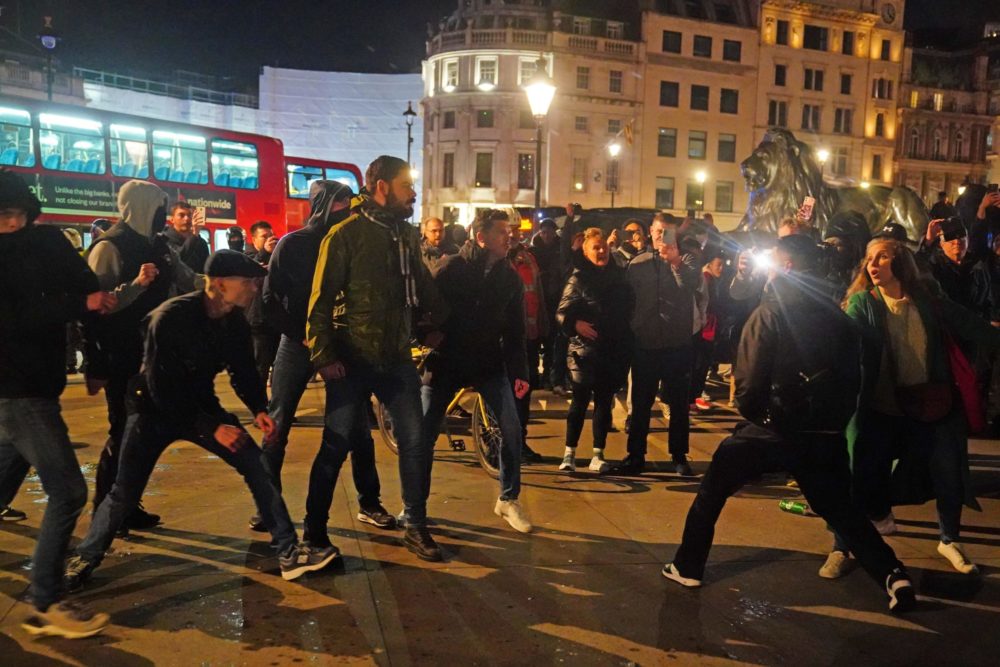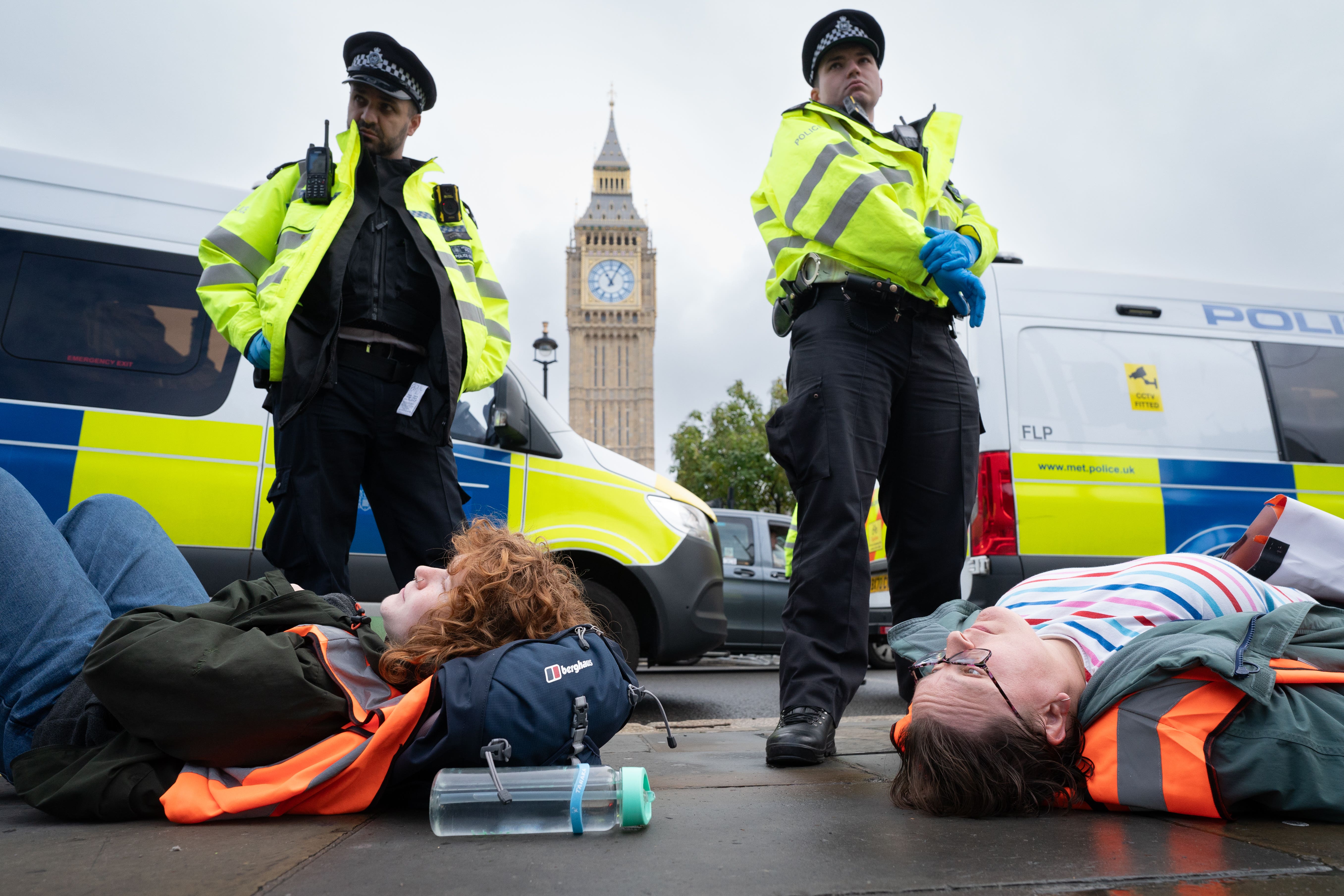UK Government unveils new protest laws to ‘crack down on dangerous disorder’

Protesters who climb over war memorials or try to hide their identity could face jail under Government plans to change the law.
Police in England and Wales will be given powers to arrest protesters who cover their face in a bid to avoid prosecution, while people who scale national monuments could face a three-month prison sentence and a £1,000 fine, as part of the proposals.
The measures – which will be added to the Criminal Justice Bill currently being considered by Parliament – will also make it illegal to carry flares and other pyrotechnics at protests amid efforts to “crack down on dangerous disorder”, according to the Home Office.
The right to protest is “no longer an excuse for certain public order offences”, the department said as it announced the plans on Thursday.
Right to protest
But campaigners have branded the measures a “threat to everybody’s right to protest”.
The move comes as police chiefs warned some protesters were “using face coverings to conceal their identities, not only to intimidate the law-abiding majority, but also avoid criminal convictions”.
Officers already have the power to ask people to remove face coverings at designated protests – where forces believe crimes are likely to occur.
But the new offence will allow police to arrest protesters who disregard their orders, with those who flout the rules facing a month behind bars and a £1,000 fine.
Under the reforms, possession of flares, fireworks and any other pyrotechnics – which the Home Office said had recently posed “significant risk of injury” and had been fired at police officers – at public processions and assemblies for protest will be made illegal, with perpetrators also facing a £1,000 fine.
Protesters will also no longer be able to cite the right to protest as a reasonable excuse to get away with “disruptive” offences, such as blocking roads, the department added.
Home Secretary James Cleverly said: “Recent protests have seen a small minority dedicated to causing damage and intimidating the law-abiding majority.
“The right to protest is paramount in our county, but taking flares to marches to cause damage and disruption is not protest, it is dangerous.
“That is why we are giving police the powers to prevent any of this criminality on our streets.”
Essex Police chief constable BJ Harrington, who leads the National Police Chiefs’ Council’s work on public order, welcomed the plans, adding that it will make sure officers “have the powers that we need to get balance right between the rights of those who wish to protest, and those impacted by them”.
The use of flares and pyrotechnics at protests is “rare” but “they are still extremely dangerous”, he said, adding: “Safety is our number one concern when policing these events, and the effective banning of these items during protests can only help in our mission to ensure that they take place without anyone coming to any harm.”
He stressed the powers would be used “when appropriate, proportionate, and necessary to achieve policing objectives”, but insisted police were not “anti-protest.”
“There is a difference between protest and criminal activism, and we are committed to responding quickly and effectively to activists who deliberately disrupt people’s lives with reckless and criminal acts,” he said.
Overreach
Akiko Hart, director of human rights group Liberty, said: “These new proposed anti-protest measures are a massive overreach by the Government and a threat to everybody’s right to protest.
“This is an outrageous attempt to clamp down on our fundamental right to stand up for what we believe in.
“Bringing in these powers put people at greater risk of being criminalised for exercising their right to protest – including disabled people, who in some situations have only felt comfortable protesting in public when wearing face coverings.
“It is extremely concerning that the Government is trying to impose even more conditions on not only when people can protest, but how they protest too.
“We all have the right to make our voices heard on issues that matter to us, but this Government has continually made it harder for us to do that.
“The Government must reverse this decision and drop these anti-protest and anti-democratic proposals.”
Liberty is embroiled in a legal battle with the Government over previously introduced “anti-protest powers”, with a High Court trial due to take place later this month, the group said.
The proposals will be introduced as amendments at the Bill’s report stage in the Commons.
Protesters face jail for wearing face masks or carrying flares under new crackdown
New blitz unveiled on people hiding their identity, using fireworks and blocking roads
Jane Dalton
Police will be given new powers to arrest protesters who wear face coverings under new laws cracking down on disorder, ministers have announced.
Demonstrators flouting an order to remove their mask could be jailed for a month and fined up to £1,000.
Anyone joining a protest will also be banned from carrying pyrotechnics, including fireworks, flares and smoke, and those using them could be arrested.

Pro-Palestinian supporters shout slogans and wave Palestinian flags
(AFP via Getty Images)
Causing disruption, such as blocking roads and people locking themselves to objects, will also be made criminalised under the sweeping crackdown, which targets environmental as well as political protesters.
Last November, fireworks were fired into crowds and towards police officers when pro-Palestinian protesters clashed with authorities in London after a demonstration.
Footage appeared to show flares being fired at a line of officers, prompting the Metropolitan Police to issue a dispersal order.
The force also issued an order giving officers the power to require someone to remove any item used to conceal their identity – such as a mask.
Police chiefs have previously warned that some protesters use face coverings to hide their identities to intimidate other people and avoid criminal convictions.
The new laws, in England and Wales, will allow officers “where police believe criminality is likely to occur” to arrest any protester who ignores an order to remove a mask.
Protesters will no longer be able to cite the right to protest as a reasonable excuse to get away with disruptive offences, such as blocking roads
The Home Office
Anyone who breaches an order may face a month behind bars and a £1,000 fine, the Home Office says.
“Protesters will no longer be able to cite the right to protest as a reasonable excuse to get away with disruptive offences, such as blocking roads,” according to officials.
Since 2021, the Conservatives have increasingly criminalised protest in response to direct action by environmental demonstrators.
But senior police and crime commissioners said then that the powers to crack down on protests were not needed and went too far, and the latest announcement is likely to prompt anger by campaigners and organisations for human rights, the climate and other causes.
Under the new measures, the possession of flares, fireworks and any other pyrotechnics at public processions and protests will be banned, with perpetrators facing £1,000 fine.
Climbing on war memorials will also be made a specific public order offence, carrying a three-month sentence and £1,000 fine.
In some recent cases, protesters have scaled national monuments.

Blocking roads will be criminalised
(PA Wire)
Home secretary James Cleverly said: “Recent protests have seen a small minority dedicated to causing damage and intimidating the law-abiding majority.
“The right to protest is paramount in our county, but taking flares to marches to cause damage and disruption is not protest, it is dangerous.
“That is why we are we giving police the powers to prevent any of this criminality on our streets.”
Chief Constable Ben-Julian Harrington, National Police Chiefs’ Council lead for public order, welcomed the proposals, saying: “As with all policing powers, these new powers will be used when appropriate, proportionate and necessary to achieve policing objectives.
“Policing is not anti-protest, but there is a difference between protest and criminal activism, and we are committed to responding quickly and effectively to activists who deliberately disrupt people’s lives with reckless and criminal acts.”
Since 7 October, when Hamas launched an unprecedented attack on Israel, killing some 1,200 people, there have been more than 1,000 protests and vigils, according to official figures, accounting for 26,000 police officer shifts between October 7 and December 17 alone, and 600 arrests.
Last year actions such as “locking on” were outlawed, and police were given powers to stop and search protesters for items such as padlocks and superglue.
The Police, Crime, Sentencing and Courts Act 2022 also made it easier to tackle public nuisance caused by protesters.
Police figures show that during last year’s Just Stop Oil campaign, 657 protesters were arrested under the Public Order Act 2023.

No comments:
Post a Comment